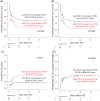The 17-gene stemness score associates with relapse risk and long-term outcomes following allogeneic haematopoietic cell transplantation in acute myeloid leukaemia
- PMID: 36051057
- PMCID: PMC9422016
- DOI: 10.1002/jha2.466
The 17-gene stemness score associates with relapse risk and long-term outcomes following allogeneic haematopoietic cell transplantation in acute myeloid leukaemia
Abstract
A 17-gene stemness (LSC17) score determines risk in acute myeloid leukaemia patients treated with standard chemotherapy regimens. The present study further analysed the impact of the LSC17 score at diagnosis on outcomes following allogeneic haematopoietic cell transplantation (HCT). Out of 452 patients with available LSC17 score, 123 patients received allogeneic HCT. Transplant outcomes, including overall (OS), leukaemia-free survival (LFS), relapse incidence (RI) and non-relapse mortality (NRM), were compared according to the LSC17 scored group. The patients with a low LSC17 score had higher OS (56.2%) and LFS (54.4%) at 2 years compared to patients with high LSC17 score (47.2%, p = 0.0237 for OS and 46.0%, p = 0.0181 for LFS). The low LSC17 score group also had a lower relapse rate at 2 years (12.7%) compared to 25.3% in the high LSC17 score group (p = 0.017), but no difference in NRM (p = 0.674). Worse outcomes in the high LSC17 score group for OS, LFS and relapse were consistently observed across all stratified sub-groups. The use of more intensive conditioning did not improve outcomes for either group. In contrast, chronic graft-versus-host-disease was associated with more favourable outcomes in both groups. The 17-gene stemness score is highly prognostic for survival and relapse risk following allogeneic HCT.
Keywords: AML; Acute leukaemia; Gene expression; LSC 17 score; Stem cell transplantation.
© 2022 The Authors. eJHaem published by British Society for Haematology and John Wiley & Sons Ltd.
Conflict of interest statement
The authors declare they have no conflicts of interest.
Figures




References
-
- Cassileth PA, Harrington DP, Appelbaum FR, Lazarus HM, Rowe JM, Paietta E, et al. Chemotherapy compared with autologous or allogeneic bone marrow transplantation in the management of acute myeloid leukemia in first remission. New Engl J Med. 1998;339(23):1649–56. - PubMed
-
- Gomez‐Arteaga A, Gyurkocza B. Recent advances in allogeneic hematopoietic cell transplantation for acute myeloid leukemia. Curr Opin Hematol. 2020;27(2):115–21. - PubMed
-
- Michelis FV, Messner HA, Atenafu EG, McGillis L, Lambie A, Uhm J, et al. Patient age, remission status and HCT‐CI in a combined score are prognostic for patients with AML undergoing allogeneic hematopoietic cell transplantation in CR1 and CR2. Bone Marrow Transplant. 2015;50(11):1405–10. - PubMed
-
- Grimwade D, Hills RK, Moorman AV, Walker H, Chatters S, Goldstone AH, et al. Refinement of cytogenetic classification in acute myeloid leukemia: determination of prognostic significance of rare recurring chromosomal abnormalities among 5876 younger adult patients treated in the United Kingdom Medical Research Council trials. Blood. 2010;116(3):354–65. - PubMed
LinkOut - more resources
Full Text Sources
